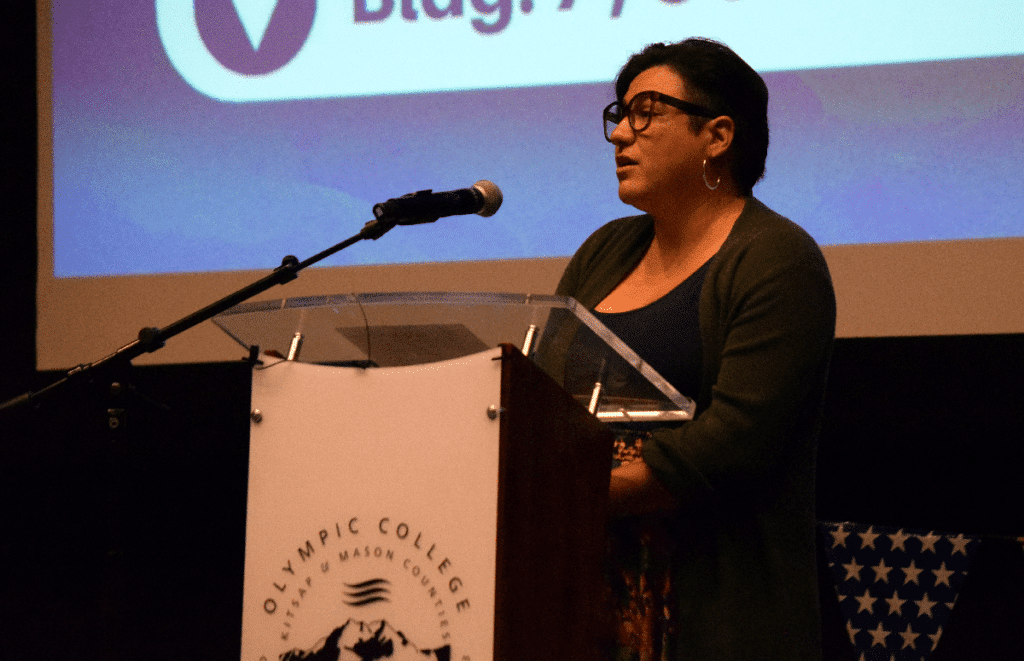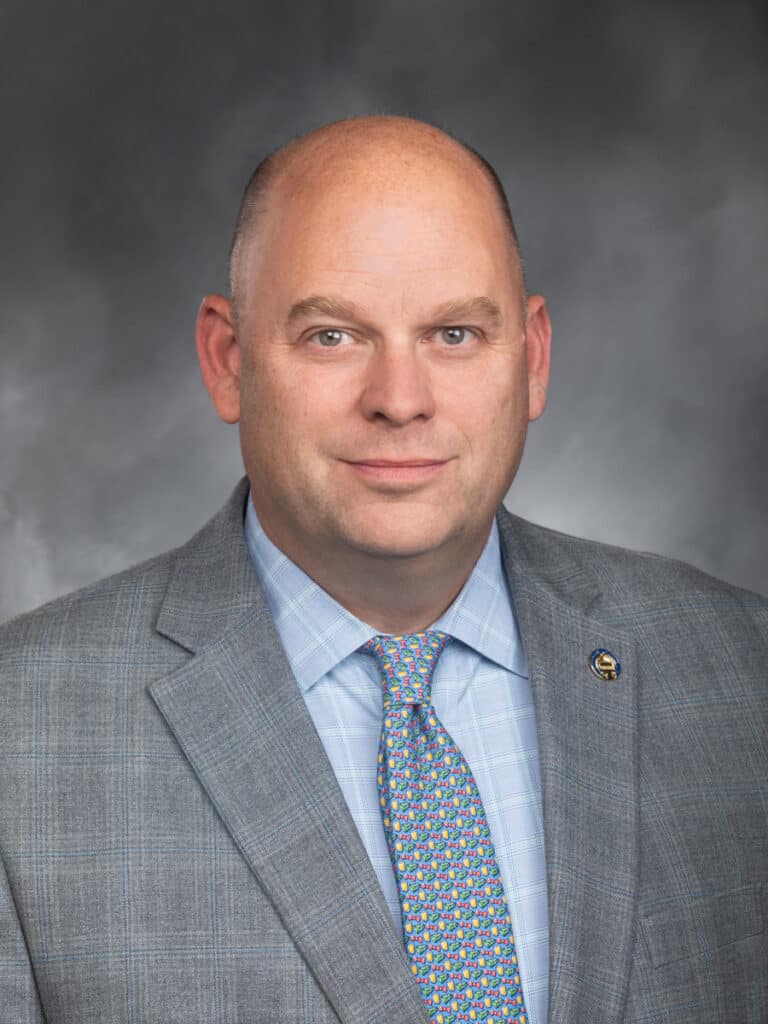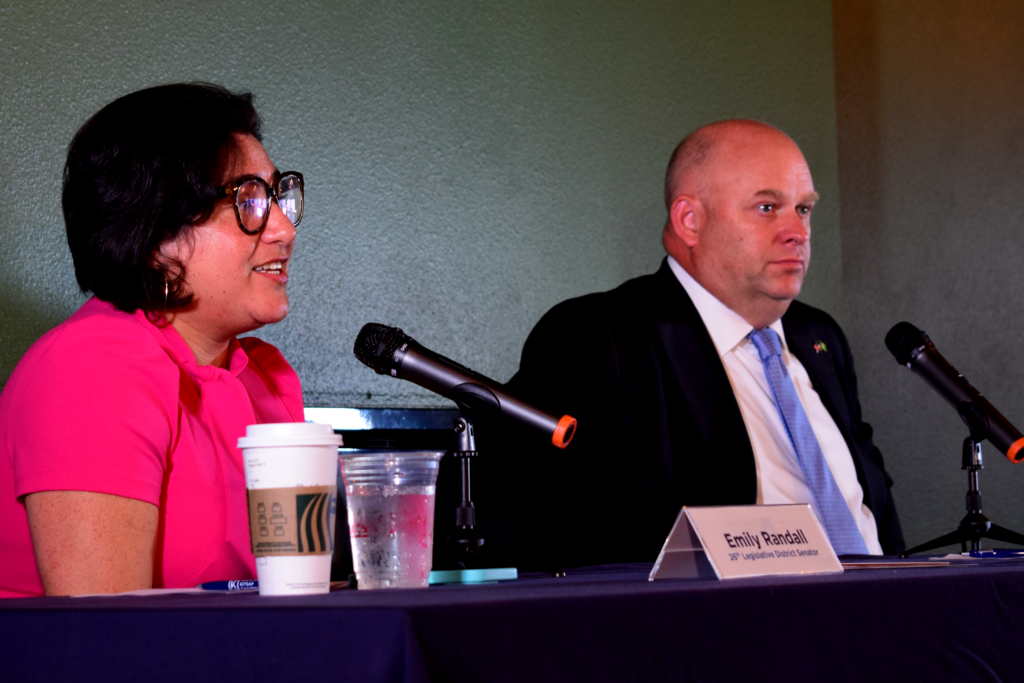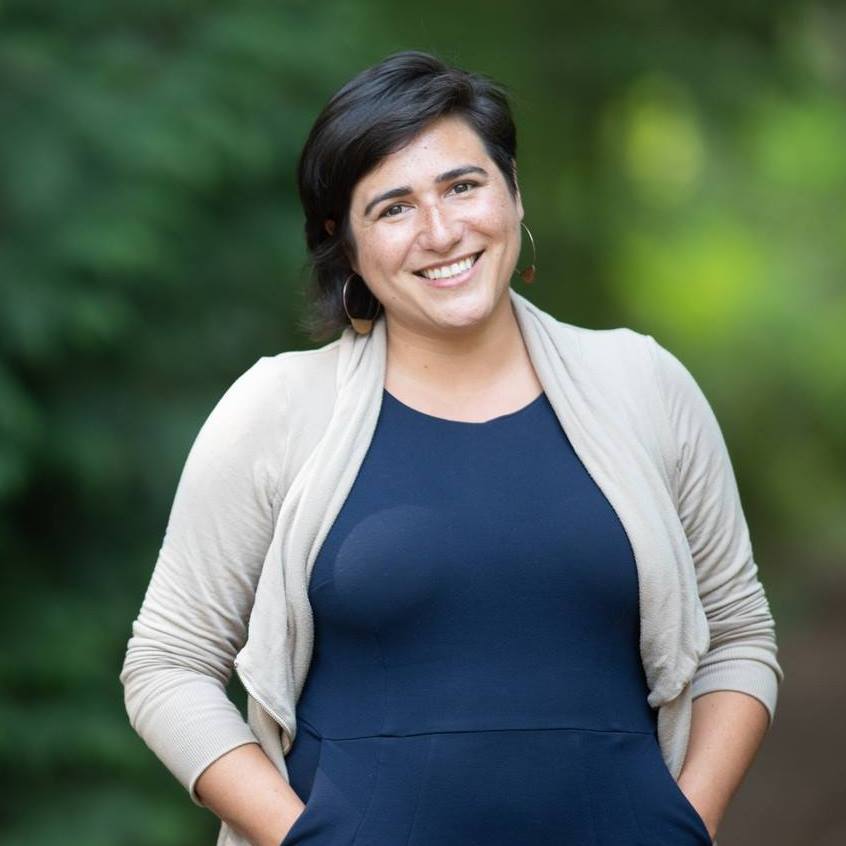Community Government
Sixth District contest matches state senators from adjacent districts
During an event at the Admiral Theater in Bremerton last week, Democratic candidate Emily Randall recounted to a colleague how she first came to the venue as a fifth-grader, winning the chance to present a check to the reigning Miss America.
Randall, a state senator from Bremerton, has frequently highlighted her Kitsap County upbringing as she campaigns to represent Washington’s Sixth Congressional District and replace the retiring Derek Kilmer, D-Gig Harbor. While talking to voters about her priorities, health care access, reproductive rights and educational opportunities, Randall emphasizes that she has shared many of her neighbors’ struggles.
“I understand some of the challenges that folks who live alongside us face,” she told students at Olympic College last week. “I grew up here, I know what it’s like to feel like opportunity is elsewhere.”

Longtime Democratic seat with a serious Republican challenger
Randall won a closely watched August primary by a margin of nearly 10,000 votes, finishing ahead of a Kilmer-endorsed opponent. Now, with the general election less than a month away, Randall is the frontrunner in her match-up with Drew MacEwen, a Republican state senator from Shelton who finished second in the primary.
Pierce County will mail ballots to registered voters on Oct. 18. Election Day is Nov. 5.
The geographically diverse Sixth District encompasses most areas west of Puget Sound — including Gig Harbor, part of Tacoma, Kitsap County and the Olympic Peninsula. Its voters have elected only one Republican, Thor Tollefson of Tacoma from 1947 to 1965, since the Sixth was established in 1933.
Before MacEwen’s run, high-profile Republicans have avoided running for the seat since at least 2012.
With over a decade in state politics across both houses of the Legislature, MacEwen hopes his well-rounded resume, which includes Navy service and business ownership, will give him a leg up on the other Republicans who have sought the office.
“I say this with all due respect to those that have run before me,” he said. “We haven’t had somebody run as a sitting, elected Republican in a long time — I mean it’s been decades.”

Drew MacEwen
MacEwen talks economy, partisanship and climate
Being in the minority party at the state level, MacEwen says he has learned how to work across the aisle and get results. He said he would take the same moderate approach to Congress.
In between a late morning meeting with the Suquamish Tribal Council and afternoon visit with a donor this month, MacEwen said in an interview he believes the political make-up of the district is beginning to shift. He points to his own 35th Legislative District as an example. Democrats have become too progressive, he said, and their policies have hurt working-class families.
Raised in Sheboygan, Wisc., about an hour north of Milwaukee, MacEwen came to Washington in the 1990s as a member of the Navy. Stationed at Naval Base Kitsap-Bangor, he served six years as a submariner on the USS Nevada while simultaneously earning a degree from Excelsior University. After discharging, he started Falcon Financial, an investment firm, where he works as the company’s president.
Has flipped a district before
MacEwen, former president of the Shelton-Mason County Chamber of Commerce, said members of the Mason County business community first encouraged him to run for state office. Voters elected him to a 35th District House seat in 2012, flipping the seat in the process. He won his seat in the upper chamber in 2022.

Democrat Emily Randall, left, and Republican Drew MacEwen. Photo by Conor Wilson
During his tenure, MacEwen sponsored legislation to bring more funding to a domestic violence shelter in rural areas. The bill changed how the state calculates funding for these facilities, recognizing that rural shelters often serve people beyond their immediate communities.
MacEwen said one of his proudest achievements has been updating state law to codify federal protections for victims of crimes who are undocumented. MacEwen said he spoke with a Shelton High School student, whose sister had been the victim of crime, but said they were fearful of reporting the crime due to their undocumented status.
“(The student) and his sister were brought here when they were toddlers. This is the only home they’ve known,” he said. “It was a real touching moment for me.”
The environment and initiatives
MacEwen serves as the ranking Republican on the Senate’s Climate, Energy, and Technology Committee. He has been critical of the Climate Commitment Act, which created a cap-and-trade program designed to incrementally reduce carbon emissions by requiring the state’s biggest polluters to buy emission allowances.
“I feel it was very disingenuous of the governor and his administration to say that sales will just be pennies per gallon,” MacEwen said. “It’s not about the underlying goal and reducing pollution. I’m all for that. But we could have taken an approach that didn’t punish working families.”
Let’s Go Washington, a conservative group, has put an initiative to repel the CCA on the November ballot. If approved by voters it would disrupt several local projects in Kitsap. A few local officials, including the Suquamish Tribal chairman, have warned against repealing the initiative.
Economy in focus
MacEwen’s campaign has focused on the economy. He says he wants to bolster trade programs for students and improve working conditions at Puget Sound Naval Shipyard.
MacEwen says Congress needs to raise civilian wages at the shipyard and invest more in educational opportunities to replace retiring workers, noting it is a matter of national defense.
He supports grants to school districts that sponsor trade programs, opening up opportunities for high students. He said he also wants to expand the GI Bill, allowing it to pay for a greater variety of educational opportunities.
“There was this big push to go towards ‘everybody’s got to go to a four year school,” he said. “There’s nothing wrong with doing that, but for a lot of kids, they’re more attune to going into the trades programs.”
Randall discusses health care access and education
Early on in her political career, Randall has shown herself to be an adept campaigner, winning a pair of close state Senate contests plus a tough primary this summer against Democrat Hilary Franz, the state’s public lands commissioner.
On the issues, little differentiated the two Democrats who filed to replace Kilmer. Heading into election day, Franz — bolstered by statewide name recognition and endorsements from the last two men to hold the office, Kilmer and Norm Dicks — appeared to have an edge.
Randall was first elected to the state Senate in Washington’s 26th Legislative District in 2018. Her victory in one of the state’s swing districts came by fewer than 900 votes and flipped control for Democrats. She won re-election in 2022 and has since become the Senate deputy majority leader.
Community history and ties
Randall attributes her string of election victories to a strong ground game. She says her ties to the community and identity as a young, LGBTQ, person-of-color motivates people to get involved and volunteer for her campaign.
“My friend Bill, who died before this election cycle, he’s a Republican and he would go out to knock go for me in the 26th [District] wearing his NRA hat.” Randall said. “There are folks who resonate with me and my experience and my background who don’t always feel like they want to be involved in regular Democratic party work.”
Raised in Sunnyslope in the same house that her mother grew up in and supported by her father’s job at the Puget Sound Naval Shipyard, Randall says she understands many of the issues residents of the Sixth District are experiencing.
Randall was a first-generation college graduate from Wellesley, a liberal arts college in Massachusetts. Prior to politics, she worked for health and education nonprofits, including as a major gift officer for Planned Parenthood.

Emily Randall
Health care focus
She returned to Kitsap following several years in Massachusetts, and said it was health care that motivated to first seek office. Randall said Medicaid acted as a safety for her family. It allowed them to provide sufficient care to her sister, Olivia, who was born with microcephaly and experienced complex disabilities.
“Since I moved away there is an even greater consolidation of our health-care system. You know, fewer and fewer options for people,” she said. “That’s an area where I focused a lot because I’ve watched it change and because I know how much it means to be able to get access to healthcare close to home and not have to take a ferry.”
At the state level, she introduced legislation to create a Universal Healthcare Commission, aimed at expanding Medicaid access to cover more people, including those who are undocumented or incarcerated. She also sponsored legislation to extend Medicare access to those who are postpartum from 60 days to a full year.
As chair of the Senate Higher Education and Workforce Committee, she said she is also proud of a bill that better integrated the post-secondary education system with the state apprenticeship programs. The legislation provides a pathway for students to earn transferable associate’s degrees from their apprenticeships.
Opportunities at home
As a young adult Randall said she was excited to leave Kitsap, because she saw limited opportunities for herself. On the campaign trail, she said she heard from many families and young adults living around the Peninsula who feel the same way.
“I know that that’s common for so many families,” she said. “I think the focus of my work, my pre-political career and my career in politics, has been on issues that I see impacting so many neighbors.”

